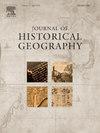Communist literary internationalism and worldmaking in the twentieth century: Kerala and the Soviet Union
IF 1.1
2区 历史学
Q2 GEOGRAPHY
引用次数: 0
Abstract
My paper explores the dynamics of twentieth-century literary manifestations of communist internationalism in the southern Indian region of Kerala vis-a-vis the Soviet Union. Drawing from Allan Pasco's notion of the literature-archive, I illustrate how communist internationalism in Kerala was expressed in terms of worldmaking in three chronological periods in response to political and literary shifts at the local, national and global levels. The first period deals with early engagements of the literature-archive from the 1910s till the 1930s, marked by a yearning for an amorphously defined new world characterised by individualised political canonical engagements with individuals associated with Marxism as well as situational identification with the worlds of Tsarist Russia and Soviet Union. The prominence of the progressive literature movement from the late-1930s until the late 1940s resulted in the emergence of multiple literary-political circles that wrought various imaginations of a socialist realist egalitarian internationalist world, producing and contesting various visions of Soviet Union. Finally, in the third period, I deal with how the Cold War context enabled the perpetuation of these literary contestations as well as the diffusion of a new mode of the cultural internationalism of the post-Stalinist Soviet Union from the 1950s till the 1980s making and contesting Soviet utopias in travelogs and children's literature.
共产主义文学的国际主义与二十世纪的世界建构:喀拉拉邦与苏联
我的论文探讨了二十世纪共产主义国际主义在印度南部喀拉拉邦地区相对于苏联的文学表现的动态。从艾伦·帕斯科(Allan Pasco)关于文学档案的概念出发,我阐述了喀拉拉邦的共产主义国际主义是如何在三个时间顺序的时期内以世界制造的方式表达出来的,以回应地方、国家和全球层面的政治和文学变化。第一个阶段涉及从20世纪10年代到30年代的文学档案的早期接触,其标志是对一个不确定定义的新世界的渴望,其特征是与马克思主义相关的个人进行个性化的政治规范接触,以及与沙俄和苏联世界的情境认同。从20世纪30年代末到40年代末,进步文学运动的突出导致了多个文学政治圈子的出现,这些圈子塑造了对社会主义、现实主义、平等主义、国际主义世界的各种想象,产生并争论着对苏联的各种看法。最后,在第三个时期,我将讨论冷战背景如何使这些文学争论得以延续,以及20世纪50年代至80年代后斯大林主义苏联文化国际主义新模式的传播,这些新模式在旅行和儿童文学中创造和争论苏联乌托邦。
本文章由计算机程序翻译,如有差异,请以英文原文为准。
求助全文
约1分钟内获得全文
求助全文
来源期刊

Journal of Historical Geography
Multiple-
CiteScore
1.50
自引率
10.00%
发文量
53
期刊介绍:
A well-established international quarterly, the Journal of Historical Geography publishes articles on all aspects of historical geography and cognate fields, including environmental history. As well as publishing original research papers of interest to a wide international and interdisciplinary readership, the journal encourages lively discussion of methodological and conceptual issues and debates over new challenges facing researchers in the field. Each issue includes a substantial book review section.
 求助内容:
求助内容: 应助结果提醒方式:
应助结果提醒方式:


